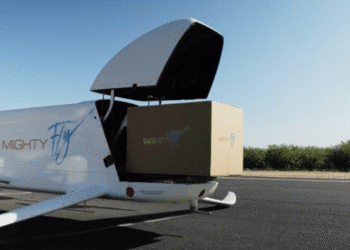Future or fantasy? Cargo industry reacts to Amazon’s drones

If Amazon proves right, the overheard whir of a drone carrying a watch, toy or pair of shoes could someday become commonplace.
The Internet has been aflutter ever since Amazon.com CEO Jeff Bezos’ announcement that drones will someday deliver packages – but the viability of the idea and its effect on air cargo remain in question. Amazon Prime Air plans to use unmanned aerial vehicles to deliver packages to customers in 30 minutes or less.
“I think we need to introduce a bit of cynicism here,” Brandon Fried, executive director of the U.S. Airforwarders Association, says. (Fried writes a monthly column for Air Cargo World.) “I think that the drone idea was advanced to generate some buzz about Amazon’s reputation, more than it was probably to inform the public that drone deliveries are a possibility in the near-term.”
Possibly the biggest hurdle for Amazon is gaining approval from the U.S. Federal Aviation Administration.
“It’s not the technology that’s going to hold it up,” Fried says. “There are enormous technical, logistical, safety, regulatory issues that have to be dealt with. And as an example, I can’t imagine the FAA just letting something like this happen to them in shorter than a five-year timeframe.”
The FAA approves unmanned aircraft systems (UAS) operations by public entities on a case-by-case basis, according to the agency’s statement on Amazon Prime Air.
“We issued our annual roadmap two weeks ago, which outlined the steps that need to happen before there would be widespread commercial use of UAS,” Alison Duquette, FAA spokesperson, tells Air Cargo World.
By the end of 2013, the FAA will announce six test sites located around the U.S., Duquette says. The first major rule, which will be for small UAS, will be issued sometime in 2014, she says. The rule will define a “small” UAS.
Meanwhile, the FAA has already missed earlier due dates for creating rules governing commercial drones. For instance, the roadmap that the FAA published Nov. 7 was supposed to be out almost nine months earlier.
Amazon hopes that the FAA’s rules will be in place as early as 2015.
“We will be ready at that time,” Amazon says.
The FAA has never approved any commercial drones for operation to the extent of Amazon Prime Air, Duquette says. Amazon released a video showing a test flight of its deliver drones, though Duquette says it wasn’t filmed in the U.S.
“So far, only a single commercial UAS operator has been approved to operate, and it is in the Arctic,” according to the FAA’s statement.
Amazon did not respond to multiple inquiries from Air Cargo World. Bezos said during his announcement that Amazon Prime Air could be running in as little as four to five years from now.
But the big questions remain – is Amazon’s idea possible and how will it affect the air cargo industry?
“I believe that given the state of technology, or the way technology is marching on, I think this – something like the air drone delivery – is indeed a possibility, maybe even a probability, but over the long-term,” Fried says. “I have no doubt that something like this will develop over time, particularly as technology logistics make these kinds of things possible, but I just don’t see it in the next five years.”
Fried says it will take at least twice Bezos’ timeframe and brings up issues such as possible drone malfunctions, weather complications and customer interactions. But Fried says whenever drone delivery does happen – no matter what company implements it – freight forwarders will be part of the equation.
“I think there’s a place for freight forwarders in this,” he says. “I’m not quite sure what it is at this point, but we’re multimodal and we’re highly adaptive creatures. So if these drones become a viable way for us to deliver packages and freight, then I’ll bet our members will be working with the early adopters to be a part of it and incorporate the mode into their channel of deliveries.”
FedEx and UPS both issued statements when Air Cargo World asked for their take on Amazon’s project.
“FedEx is always interested in new technology to better serve our customers,” according to its statement. “While we can’t speculate about this particular technology, I can say that making every customer experience outstanding is our priority, and anything we do from a technology standpoint will be with that in mind.”
UPS had a similar response concerning delivery using drones.
“UPS is in the logistics business and have been innovators for the benefit of our customers for decades. The commercial use of drones is an interesting technology, and we’ll continue to evaluate it. We invest more in technology than any other company in the delivery business, and we’re always planning for the future.”




